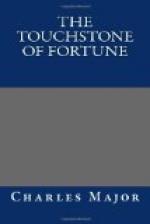“Perhaps you are right, but the less we know or think or say about this affair, the better it will be for you and me. As for myself, I shall leave London for a while to avoid being called as a witness in case the matter is investigated. If we try to bring these fellows to justice, they may turn upon us and swear that we did the deed, in which case we might hang, for they are three to two; a good preponderance of testimony. But in any case the king would see that no evil befell his son and his friends. Therefore if we are wise, we shall remain silent and take ourselves out of the way for the time being.”
The next day, as I afterwards learned, George made the mistake of returning to France, not that he feared punishment for himself, but because he did not want to speak the unavailing truth and thereby bring upon himself the king’s wrath, nor did he want to bear false witness to protect the criminals.
Near the hour of ten o’clock that night, Noah drew up the fat panting horses before Sir William’s house. The porter, who had been watching all day, opened the gate, the coach entered the courtyard, Noah uttered a hoarse “Whoa!” and almost fell off the box to the ground. As soon as he could get on his feet again, he went to the coach door, spoke to Frances, ran to Sir William, who was waiting at the top of the house steps, candle in hand, to welcome Roger, and spoke but one word: “Dead!”
Frances hurriedly came from the coach, and Sir William went to meet her. Holding out her hands to him, she cried:—
“Oh, Sir William, they have killed your brother! Robbed him and killed him!”
Frances was incoherently explaining to Sir William when Lady Wentworth came down the steps and led her into the house. Then the doors were opened wide, and poor old Roger’s body was carried reverently to the best parlor.
The following morning, when I was notified that Frances was at Sir William’s house, I went to see her and learned the particulars of the tragedy, though she said nothing at that time about having recognized any of the highwaymen, and seemed strangely reluctant to talk about the affair.
On the fourth day after Roger’s death he was buried in Saint-Martin’s-in-the-Fields churchyard, good Sir William taking the only means in his power to express his love for his brother by an elaborate funeral. Never were there more beautiful hatchments seen in London. They bore Roger’s humble coat-of-arms, half in white and half in black, to denote that the deceased had left a widow. Never were there more nor finer white mourning scarfs distributed among the mourners, and never in the memory of man had so much burnt sherry been served at a funeral.
These extraordinary arrangements attracted a great deal of attention throughout London and caused Roger’s murder to be talked about far and near. The result of this publicity was that the city authorities set on foot an investigation which soon brought Wentworth, Crofts, and Berkeley under suspicion. The sheriffs, however, kept their suspicions to themselves, and I heard only faint whispers of what was going on.




